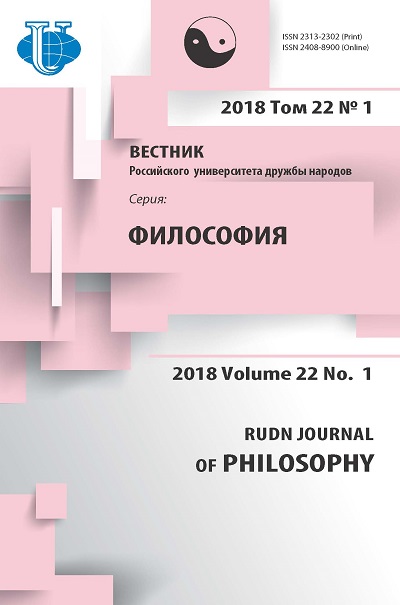Two Senses of Indian Theory of Polemics
- Authors: Kanaeva NA1
-
Affiliations:
- National Research University “Higher School of Economics”
- Issue: Vol 22, No 1 (2018)
- Pages: 8-17
- Section: HISTORY OF INDIAN PHILOSOPHY
- URL: https://journals.rudn.ru/philosophy/article/view/18137
- DOI: https://doi.org/10.22363/2313-2302-2018-22-1-8-17
- ID: 18137
Cite item
Full Text
Abstract
The article identifies two senses of the theory of controversy developed in the traditional Indian culture - logical and religious-philosophical (metaphysical). The researchers didn’t ever rise the problem of their differentiation because Indian philosophers did it by default, and for the Western reader of their texts two consequences of the division - the use of logic for destruction of logic (as it was in the Madhyāmaka school), or fixation of rules for virtually endless justification procedure (as it was in Jaina dialectic) - look like absurdity. However, in India, the need of discursive thinking was recognized, but the ability of thinking was never treated as absolute, and rational methods were used for the formation of convictions in the truth of metaphysical super-rational theses. Two named meanings are discernible in such works as the Buddhist canonical text “Kathāvatthu” and as Jaina canonical text “Stānāṅga-sūtra”. The conjunction of the two senses of the controversy determined the lack of ideal of objective truth in Indian logic, and that conjunction became the premise of two Jaina dialectical concepts: syād-vāda and naya-vāda, which are the complements to ontological Jaina concept of anekānta-vāda. Not accidentally Umāsvāti, Kundakunda - the founders of Jaina philosophy - paid attention to the naya-vāda. The author analyses the logical structure of discussion from “Kathāvatthu”, where the reality of the empirical subject (ātman) is argued, and the contradictions in the teachings of the opponents of the substantiality of the soul (ātman) are showing.
About the authors
N A Kanaeva
National Research University “Higher School of Economics”
Author for correspondence.
Email: nkanaeva@hse.ru
кандидат философских наук, доцент Школы философии факультета гуманитарных наук
Staraya Basmannaya st., 21/4, Moscow, Russia, 105066References
- Solomon EA. Indian Dialectics: Methods of Philosophical Discussion. In 2 vols. Vol. 1. Ahmedabad: B.J. Institute of Learning and Research, Gujarat Vidya Sabha; 1976—1978.
- Vidyabhuṣaṇa SC. A History of Indian Logic: Ancient, Mediaeval and Modern Schools. Calcutta: Calcutta University; 1978.
- Shaha SM. Anekānta and the Problem of Meaning. Annals of the Bhandarkar Oriental Research Institute. 1986; 67(1/4):139—145.
- Kundakunda. Pañcāstikāya-sāra. Perev. s Prakrita. In: Jeleznova NA. Ucheniye Kundakundy v filosofsko-religioznoy tradicii jainizma. Moscow: “Vostochnaya litaratura” RAN; 2005. p. 237—267. (In Russ).
- Umāsvāti. Tattvārthādhigama-sūtra. Perev. s Sanskrita. In: Jeleznova NA. Digambarskaya filosofiya ot Umāsvāti do Nemichandry: istoriko-filosofskii ocherki. Moscow: “Vostochnaya literatura” RAN; 2012. p. 73—178. (In Russ).
- Kanaeva NA. “Naya-Karṅikā” Vinaiyi Vidjayi Maharadji. Perv. s Sanskrita, issled. i comment. Istoriya filosofii. 2009; (14): 240—261. (In Russ).
- Ganeri J. Argumentation, Dialogue and the Kathāvatthu. Journal of Indian Philosophy. 2001;29: 485—493.
- Points of Controversy (Kathāvatthu). Tr. by S.Z. Aung & C.A.F. Rhys Davids. Bristol, London: Pāli Text Society; 1915.
Supplementary files















